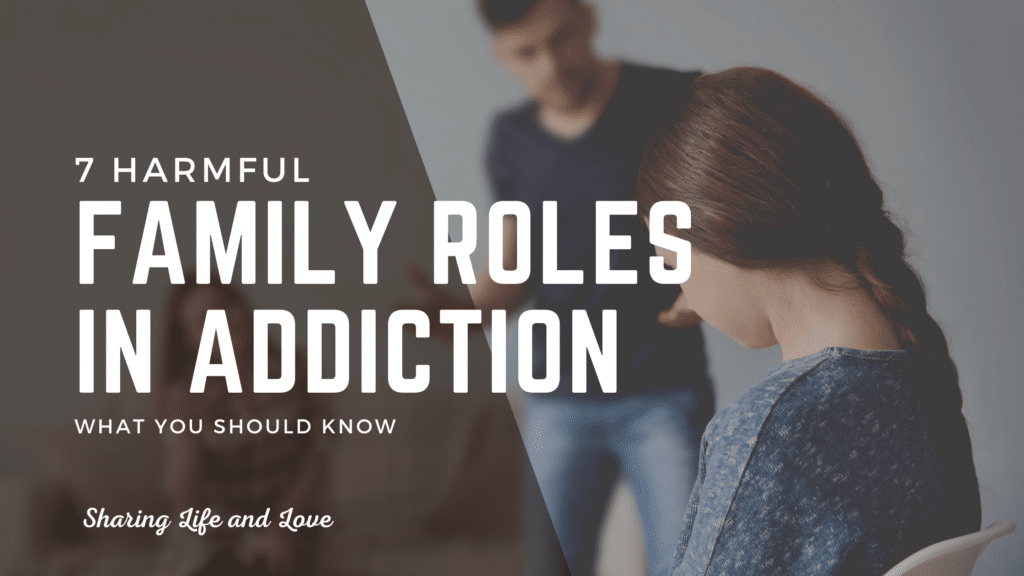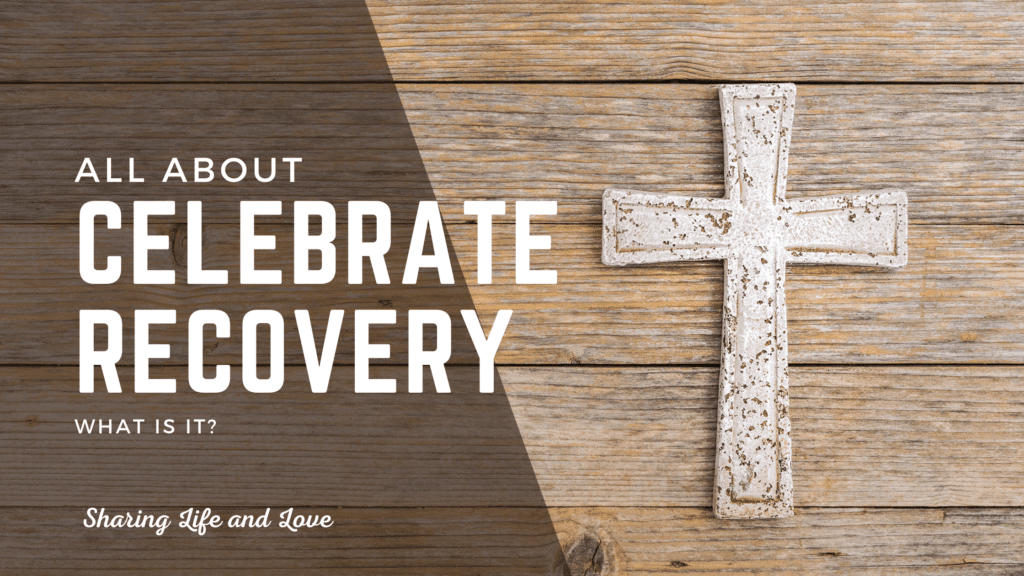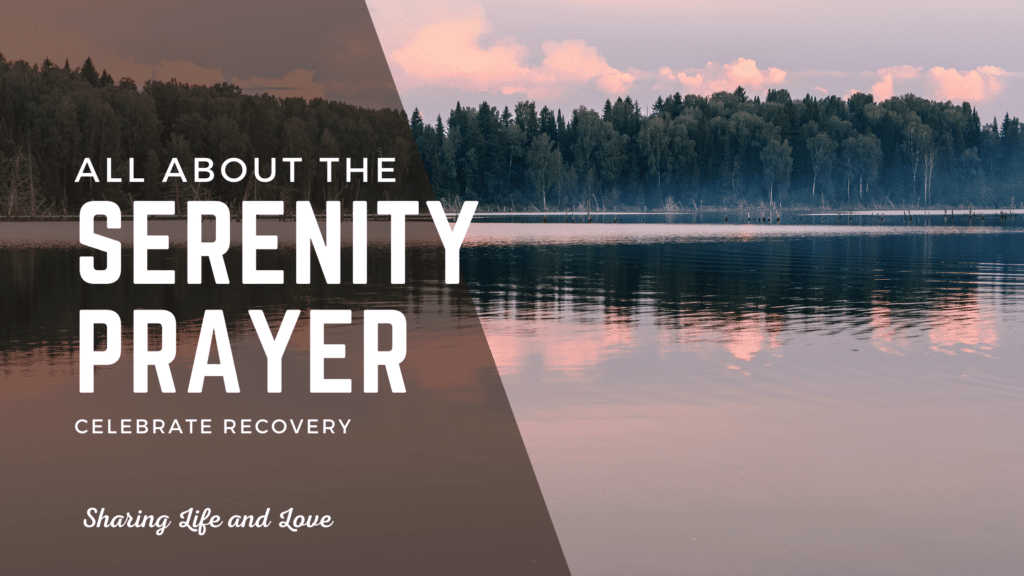Have you ever wondered what roles family members play in addiction? Do you know the dysfunctional family roles in addiction?
Addiction is a disease that affects the whole family. Family members use coping strategies to navigate the chaotic world of addiction. These coping strategies are called family roles.
Living in a household with an addict can mean living a daily life uncommon to others. Coping strategies can cause lasting negative effects on the rest of the family.
Common roles of coping with an addict may seem to help at first, but these roles can stress the family dynamics to a breaking point. You can learn how to change this behavior!
This article will provide a breakdown of the family roles in addiction. Identify which family role you are fulfilling and how to break the cycle of addiction!
Related: What Is Celebrate Recovery?
This post may contain affiliate links. Please visit our Privacy Policy for more information.
Why It Is Important to Identify Your Role in an Addicts Life
Family roles shine light on the negative ways drug or alcohol addictions affect the family.
Identifying the roles of family members in addiction is vital. Healthcare professionals say it can help you manage the balance in your home better.
We all develop ways of coping when it comes to living with an addict! These coping strategies don’t make you a bad person! You can better help your loved one successfully recover by learning and understanding your role.
Since addiction roles in the family are not permanent, you can overcome any negative coping strategies you are currently experiencing. Family counseling can greatly help the healing of addicts! Consider joining a family addiction support group.
Identifying roles in a family with addiction allows for healing as a whole. Learn which role you might be playing that could be contributing to the struggles of daily life for an addict rather than the recovery.
Related: Learn The Celebrate Recovery Serenity Prayer

The Effects of Addiction on Family Life
According to Wikipedia, addiction is a brain disorder. It is an uncontrollable urge to do things that feel or seem good. An addict does this regardless of the consequences.
It can be difficult to recognize codependency roles. In a family with addiction, codependency roles leave a mark. While your journey may have other side effects, there are some common ones.
Listed below are some of the effects of addiction on family life.
- Unhealthy coping mechanisms can lead to physical or mental illness. This can include dangerous sexual activity or co-dependent relationships. It may be an eating disorder or even an addiction to pain.
- There is a higher risk of Substance Use Disorder (SUD).
- Family members of addicts tend to suffer from social disorders. These can include isolation and social anxiety.
- Irrational fears of abandonment and authority figures are common.
- Financial strain can lead to the inability to manage home finances.
- Family members of addicts often struggle to handle criticism.
- Children of addicts tend to show difficulty in expressing emotions.
- A tendency to have unhealthy relationships is another effect. Family members of addicts may engage in dangerous sexual behavior. They may also become intimate with another addict.
- Another side effect is being judgmental.
- There are also health risks due to high stress and a sense of over-responsibility.
Related: Find Out Who Celebrate Recovery Is For
The Importance of Family in Recovery
The role of family in addiction recovery is crucial. A family should have proper education and support during recovery. They can help with not only a successful recovery but also with preventing relapses! Many treatment centers offer this kind of support for family members!
Addiction can cause fear and distrust within a family. Understanding the disease can help in rebuilding the trust between loved ones. You can learn to heal together and unlearn any negative behaviors.
A family can learn to support their loved ones through recovery. You can do this by setting appropriate boundaries for the future. Don’t permit yourself the opportunity to repeat past mistakes! You must adjust your mindset to improve communication.
There is a connection between mental health and addiction. Some addicts “use” because of mental health issues.
Anxiety and depression are both linked to addiction. Other issues that can affect addiction recovery are relationship or financial struggles.
Celebrate Recovery focuses on unresolved past issues as a form of healing. A family needs to work together to resolve issues and heal the whole body!
Family Roles in Addiction
Sharon Wegscheider-Cruse first identified 6 common family roles in an addicted household. You might find that you embody many aspects of roles or other coping methods not listed.
These roles were originally considered for families of alcoholics. Psychologists now have a better understanding of addiction. Family roles found in addiction and codependency cross over all aspects of addiction.
Read through the different family roles. As you do, ask yourself if you are prone to any of these traits.
The Addict
The addict is the main character in the story. Is it possible that you, as a family member, are an addict?
Addiction is often an individual’s primary way of coping. However, it can be a vicious cycle. The addict might lie, manipulate, and hurt to justify their addiction.
The consequences of these actions cause more pain and dysfunction within the family. They will then use the consequences of their behavior as an excuse to feed their addiction.
This cycle repeats until a new way of coping develops. Addiction is not a behavior that can just be stopped. It must be unlearned. In its place, a new behavior should be created.
Often, an addict will blame others for their circumstances. They might also express an inability to manage their moods. Codependent family roles in addiction allow the addict to continue their behavior.
The Enabler
The enabler is sometimes seen as the peacekeeper of the family. Their actions shield the addict from any consequences and even cover their responsibilities. They continuously try to keep everyone happy.
The enabler might even provide drugs or alcohol to the addict. They do this to keep the addict happy and maintain peace in the family.
Enabling an addict allows them to continue any addictions. Enablers make excuses for the addict and may even go as far as to hide their addiction from the family. An enabler might even have their own addiction problems.
The Hero
The hero typically has a type-A personality. They try to overpower the problems with their achievements. They are usually very self-sufficient and viewed as the “golden child,” meaning a child who is favored and held in high esteem.
The hero attempts to keep the spotlight on themselves. Doing this gives the addict a chance to hide in their shadow.
The hero tries to do everything right in an attempt to restore normalcy to the family. This can cause exaggerated negative reactions to the addict’s problem. They often experience high levels of stress and anxiety for everyone involved.
The Scapegoat
The scapegoat takes the blame for the family’s problems. They do anything they can to shield the addict from blame or responsibility. This can include lying or manipulating a situation to make themselves appear as the guilty party.
This causes the addict to escape the consequences of their actions. The scapegoat might be a second child or middle child but can be anyone in the household. They might be acting out of defiance and exhibit low self-esteem.
The Mascot
The mascot copes by bringing humor and joy about the situation to the family. They shield themselves from the severity of the situation by making jokes.
For the addict, this creates an atmosphere that assumes the problem is not so bad. Deflecting from the problem can often lead to an inability to deal with conflict.
The Lost Child
The lost child is most often the youngest child in the family. They might withdraw and even show severe antisocial characteristics. The lost child will typically be shy. They might try to make themselves invisible, especially in uncomfortable or confrontational situations.
The relationship between the lost child and addict will likely suffer and not be as deep as it could be. As an adult, the lost child usually struggles to develop intimate relationships.
The Martyr
The martyr exaggerates the problem. They make the discomfort and distress of the situation worse than it is to gain sympathy from others. They will change the focus of attention on their own suffering instead of the illness of addiction.
The family focuses energy on healing the martyr. That energy could be used to help the addict recover.
Related: The Celebrate Recovery 8 Principles You Need To Know

Identifying Your Role in a Household with Addiction
Now you understand the roles of family in addiction. You are ready to identify which role you are fulfilling.
Identifying with a family role does not mean you are a bad person or should feel guilty! We all develop methods of coping in times of difficulty and stress.
It is no secret that addiction plays a role in American families. According to statistics, codependency is a major factor in harmful family roles. Studies even show that 90 percent of the American population displays codependent behavior.
Identifying your role can lead to an understanding of your strong points because it helps you turn around what you are doing wrong. Here are some ways to identify your role in addiction.
- Seeking professional help can provide treatment for the entire family. In fact, family roles in addiction can change over time with the right help!
- Journaling about situations can help you identify behavior patterns. When you do this, you should keep track of your reactions and emotions for the best results.
- Having a support network will give you even more insight into your behavioral patterns.
- Talking with the addict can also lead to a greater understanding of what you are doing and in what ways so that you can assess the problem.
- Praying is always important. Allow the Holy Spirit to guide you! Spend time in prayer and seek God’s wisdom.
Related: Get Started With Celebrate Recovery Lesson 1
Breaking the Cycle of Addiction
You are ready to learn a new family role in addiction recovery!
Breaking the cycle of addiction is liberating and powerful.
A recovering addict needs support. Encourage your loved one’s recovery by taking on healthy behaviors. Healthy family roles hold a loved one accountable for their actions. They also reward good choices.
You can use your strongest traits to influence the addict’s life positively.
For example, the scapegoat often displays characteristics of a protector and a deep love for the addict. This person wants to shield the addict from harm.
The scapegoat can focus on the long-term consequences of the addict’s choices. They can shield them from any harm they are causing by encouraging them to get better.
There are key steps you can take to break the cycle of addiction in your family.
- Identify the root cause of the addiction.
- Create new habits that reinforce positive reactions.
- Seek counseling as a family unit.
- Set boundaries that you are firm in maintaining both for yourself and the addict.
- Avoid situations where you might return to your previous harmful family role.
Resources For Family Roles in Addiction
Do you want to learn about the roles of the family in addiction recovery? Check out some amazing resources!
Dysfunctional Family Roles and Addiction Recovery identifies roles in addiction. Learn to build a healthier, sober life and a successful recovery. Watch this family role in addiction video to understand your part better!
Addict in the Family: Support Through Loss, Hope, and Recovery is a one-of-a-kind resource. The book recognizes the pain of addiction. It speaks of comfort, hope, and understanding! With Addicts in the Family, you will discover how to enjoy life more fully!
Overcome Addiction: 365 Inspirations For Recovery (Addiction Books) inspires! Use this book to understand addiction better. It can help curb cravings and explain how to grow closer through recovery!
Safe From the Storm: Healing the Wounds From Your Loved One’s Addiction is about teaching family roles in addiction. You will learn about the various coping mechanisms you can use. This book is the ideal tool to kick-start your healing process!
Prodigal: A Journey to Freedom from Abuse and Addiction is a jaw-dropping story. Read of the harrowing events that led to one man’s sex addiction and his path to recovery! You will see addiction as you never have before! Be prepared to have your heart overturned!
All in the Family: Living with or Loving Someone with an Addiction teaches you how to show your love to an addict. Live a calmer, less stressful life. This book will dig into the behaviors that affect the addict in your life.
Frequently Asked Questions
Who is Wegscheider-Cruse?
Sharon Wegscheider-Cruse is a professional family therapist. As the co-founder of the National Association of Children of Alcoholics (NACOA), she believes in therapy for addictions. Sharon is the author of over twenty books, including five best sellers. She first identified the six family roles in addiction.
What are the Characteristics of an Addictive Family?
Children who grow up around addiction display specific characteristics. As adults, they can overreact to changes outside of their control. They also exhibit a need to control and might have impulsive behavior. These children can be judgmental and seek attention.
What are some examples of Addictive Behavior?
The examples of addictive behavior in both behavioral and physical addictions are similar. Behavior that could signal an addiction is an inability to stop. Addicts may engage in risky behavior. Changes in moods, appetite, and sleep patterns are also signs. Watch for legal and financial troubles, along with denial, lying, and manipulation.
What are the Two Forms of Addiction?
All addictions fit into two categories. The two forms of addiction are behavioral and physical. Physical addictions include alcohol, substance abuse, and drug addiction. Behavioral addictions would be things like sex addiction or food addiction. They could also be pornography or gambling.
What are Family Roles?
Family roles are recurrent patterns of behavior. Family members adopt these to fulfill the needs of a family unit. These behaviors can be both positive and negative. Positive family roles are parental roles, moral discipline, caregivers, etc. These roles become negative when used to shield a person from the consequences.

Conclusion
Hopefully, this article has helped you understand and identify the family members’ roles in addiction.
Addiction can come in many forms! Pay attention to repetitive behaviors that create negative consequences.
Take the time to speak to your loved ones. Discover your family role and how you can change for the better!
Knowledge can lead to a more successful recovery with a reduced chance of relapse. We all have hurts, habits, or hang-ups that we are facing. We encourage you to learn more about Celebrate Recovery and how it can provide help for addicts and their families!
Are you or a loved one currently dealing with addiction? Reach out to us, and let us pray and support you!
Remember to share this article with friends and family! May God continue to bless you!



